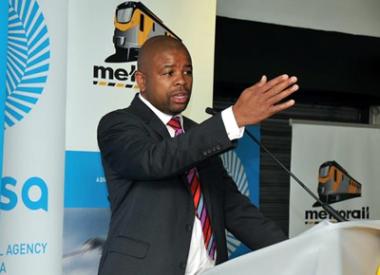Prasa set to introduce electric high speed trains in 2015
 Tshepo Lucky Montana, CEO of Passenger Rail Agency of South Africa (Prasa) addresses the media and members of the public on the announcement of the rolling stock fleet renewal programme.
Tshepo Lucky Montana, CEO of Passenger Rail Agency of South Africa (Prasa) addresses the media and members of the public on the announcement of the rolling stock fleet renewal programme.
In a bid to ease congestion and make better use of public transport, the Passenger Rail Agency of South Africa (Prasa) is set to introduce an electric high speed train fleet in 2015, which will offer faster journey times and greater reliability.
Prasa CEO Lucky Montana said once they conclude negotiations in the coming months, they will commence building the trains.
Montana was speaking in Johannesburg on Tuesday at the unveiling of the features of the new fleet of trains, as well as the announcement of the preferred bidder for the rolling stock fleet renewal programme.
In 2005, Prasa went to the national Treasury to ask for R700 million to refurbish the current ageing fleet of trains.
Prasa has appointed Gibela Rail Transportation, a consortium that is led by French company Alstom, to manufacture the trains.
Montana said Gibela was selected after a rigorous and thorough evaluation process, which involved executive managers at Prasa and transaction advisors from reputable firms throughout the world.
“What is remaining now that we have a preferred bidder is to find their Black Economic Empowerment partner.
“Companies who bought tender documents at the close of the invitation to participate on September 30 2012 have until this Friday to submit their bids.
“We will evaluate their bids and at the end of January. We will announce the name of the company that will partner with Gibela Rail Transportation in designing, manufacturing and delivering modern commuter trains, which will boast the latest available technology in the rail industry,” he said.
Montana said they were currently upgrading their depots to ensure that the signalling on their network throughout the country improves so that by the time the new trains arrive, the system is compatible with them.
Last week, Prasa awarded Siemens a contract worth R2.762 billion over the next seven years for the modernisation of its signalling system in Gauteng.
This contract is for Phase 2 of the national re-signalling programme for Gauteng. The contract for Phase 1, which was valued at R1 billion, was awarded in 2011, also to Siemens.
Phase 1 of the programme aims to replace a third of the obsolete signalling installation over the next four years in Gauteng, while Phase 2 would cover the remainder.
During August 2012, Prasa awarded the KwaZulu-Natal and Western Cape re-signalling contracts to Bombardier Africa Alliance and Thales Maziya consortia respectively, with work already having commenced for the total re-signalling of all these regions.
These contracts will run concurrently over the next five to seven years to replace the existing signalling installation with modern electronic interlocking.
The value of the contracts for Durban and Cape Town over the next five to seven years is in excess of R5 billion.
“The national re-signaling programme being carried out in KwaZulu-Natal, the Western Cape and Gauteng, will together with the new trains, provide a modern and safe urban rail commuter network, capable in future of moving in excess of 60 000 passengers in peak periods on dedicated corridors,” Montana said.
The national re-signalling programme, with a total value of R17 billion, is part of Prasa’s modernisation and recapitalisation programme.
The re-signalling project is one of the key programmes aligned with the acquisition of new rolling stock for the commuter system in South Africa.
“The re-signalling programme … [will] ensure that trains can be operated on regular intervals with increased frequencies of up to three to five minutes in peak hours,” he said.
The current signalling system is outdated and obsolete, and has a major impact on service quality in the Metrorail system.
















